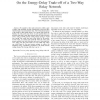Free Online Productivity Tools
i2Speak
i2Symbol
i2OCR
iTex2Img
iWeb2Print
iWeb2Shot
i2Type
iPdf2Split
iPdf2Merge
i2Bopomofo
i2Arabic
i2Style
i2Image
i2PDF
iLatex2Rtf
Sci2ools
88
Voted
CISS
2008
IEEE
2008
IEEE
On the energy-delay trade-off of a two-way relay network
—We consider a three node network in which a pair of nodes with stochastic arrivals communicate with each other with the help of an intermediate relay. The bi-directional nature of the traffic, in this setting, poses a new energy delay trade-off. Namely, the relay node may choose to cache packets from one direction and send it only after packets from the other direction arrive, using an XOR network coding scheme. Doing so would save energy, but would also incur some delay for the packet. In this work, we analyze this trade-off when the relay node queues packets from each direction and uses a first-come-firstserve policy. We show that under an even traffic load where one would hope for the most energy savings, to achieve the minimum energy expenditure promised by the XOR network coding scheme, the average delay has to go to ∞.
| Added | 29 May 2010 |
| Updated | 29 May 2010 |
| Type | Conference |
| Year | 2008 |
| Where | CISS |
| Authors | Xiang He, Aylin Yener |
Comments (0)

